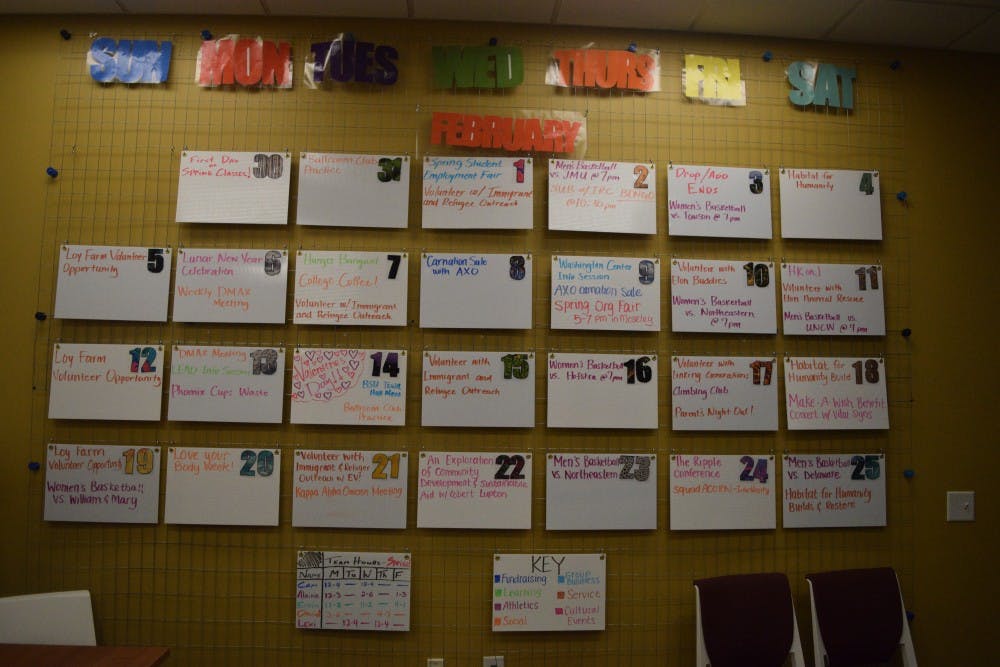Last year, 29 members of Elon University’s student body, faculty and staff published a list of 42 recommendations to increase student involvement in academic, social and intellectual activities. More than a semester later, there might not be many tangible results yet, but change is in progress.
The Presidential Task Force on Social Climate and Out-of-Class Engagement — as the group of 29 was collectively known — released this list almost a year ago in May 2016, which included everything from the expansion of late-night food options to exploring lateral entry for fellows programs.
Their recommendations fell into five categories: managing expectations, messaging and the transition of freshmen, increasing access to high-quality mentoring experiences, enhancing traditions and campus social experiences, enhancing the physical campus environment and reviewing and revising institutional policies and practices.
The responsibility for overseeing these recommendations’ progression has since fallen to Randy Williams, associate vice president for campus engagement and assistant professor and Tony Crider, associate professor of physics — co-chairs of the task force implementation team.
Crider said he and Williams are not in the business of addressing each recommendation themselves, but instead they find or create other groups better-suited for the task at hand.
“[We’ve been] trying to figure out who are all the different people that are organizing these things, and also making sure that we don’t have two groups trying to accomplish the same thing and not know about each other,” Crider said. “It’s one of the things that we’ve been very deliberate about this very first semester is saying, ‘Alright, instead of creating 42 committees, who’s already doing this?’”
Williams said their role then involves coordinating these groups.
“We’re just then mapping all these efforts together for this whole construct of social-climbing,” he said.
This fall, Crider said they have been preparing for the long road ahead. “The implementation team has spent this past semester as sort of an umbrella organization,” he said. “As we approach the spring, we’ve identified those groups, and we’ll be asking them to list what their five-year plans are.”
Crider and Williams said they are trying to make sure these tasks are implemented well rather than quickly.
They said they see the implementation of every item on the list as a project that will span the next five years.
“Our job for the implementation team is not the sprint of last year’s large group, but it’s sort of managing a marathon for other people,” Williams said. “We’re overall marathon coordinators.”
A lot of their work, Williams said, involves or will involve discussions and trial-and-error.
This would explain why results have not been immediate in the case of many of the task force’s recommendations, though some have already been completed or are in the process of becoming nearly so.
Some changes began before the list was officially released, especially in the Moseley Center where the PhoenixCONNECT Office is located.
This office embodies the goals of numerous recommendations from the task force’s list, but their message especially echoes the ideas of the third category — enhancing traditions and campus social experiences.
Senior Cam Ciesielski is a member of the connections team. He said the goal of the office is to be the center of student involvement on campus.
“Obviously, you have the office of Student Involvement, but this is front-and-center down in Moseley on the first floor, very accessible for students to walk in and find organizations or causes or events they’re passionate about and that they can attend and get involved in,” Ciesielski said.
Senior Alaina Schukraft is another member of the PhoenixCONNECT team that staffs the office. “It’s students helping students get connected … if a student comes in here, looking for a way to get connected on campus, we help them use PhoenixCONNECT to get involved.”
PhoenixCONNECT is the online half of this equation. At elon.collegiatelink.net, students can investigate ongoing and upcoming events around campus and get in touch with student organizations from the comfort of their dorm rooms if they would rather not journey to Moseley.
A journey to Moseley, however, does have its benefits. “Obviously, we have our big calendar which is kind of the hallmark of the office right now — just showing all sorts of different things that we have kind of highlighted as going on around campus,” Ciesielski said.
Like the implementation team of Crider and Williams, Ciesielski, Schukraft and the rest of the connections team have a challenge ahead of them, but they are looking onwards and upwards.
Ciesielski said right now they are working on “really just getting the word out and establishing a reputation — obviously as a new office, it takes some time to get a foothold.” He said they hope to incorporate their office more into the new student orientation process.
The entire new student orientation and first year transition is the focus of a large portion of the task force’s recommendations.
For example, with regard to Elon 101, which is mentioned in a number of action items, a consultant was called in to recommend areas for improvement in the entirety of the freshman transition and first year experience, as mentioned in the first category of the task force’s recommendations.
p.p1 {margin: 0.0px 0.0px 0.0px 0.0px; text-align: justify; text-indent: 12.0px; font: 10.0px 'Minion Pro'} span.s1 {font-kerning: none}
As for those changes, “We’re in this pilot stage right now, so we’ll assess what has happened in the pilot stage and then consider Elon 101 in the grand scheme of the first-year experience,” Williams said.


